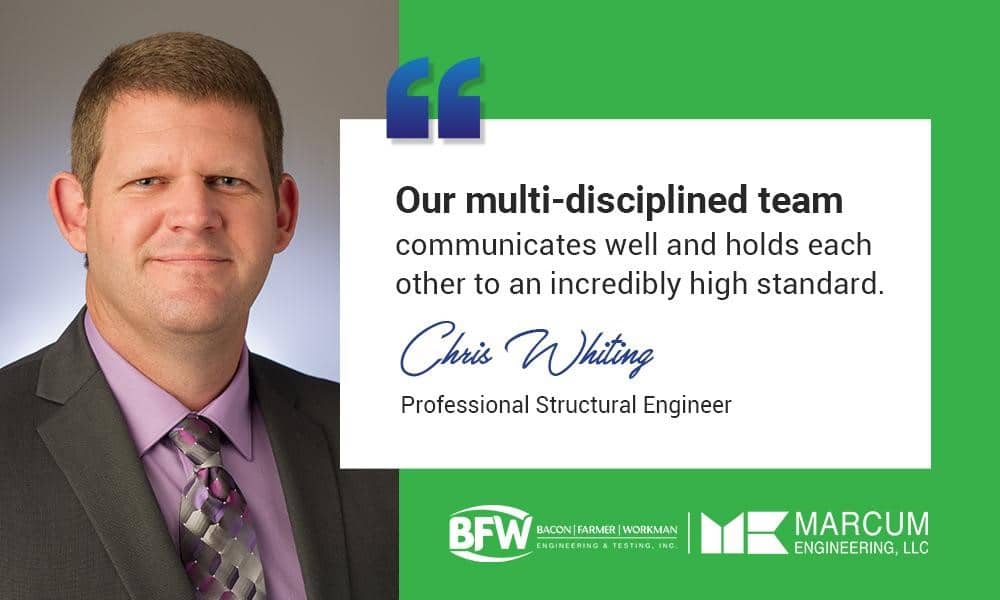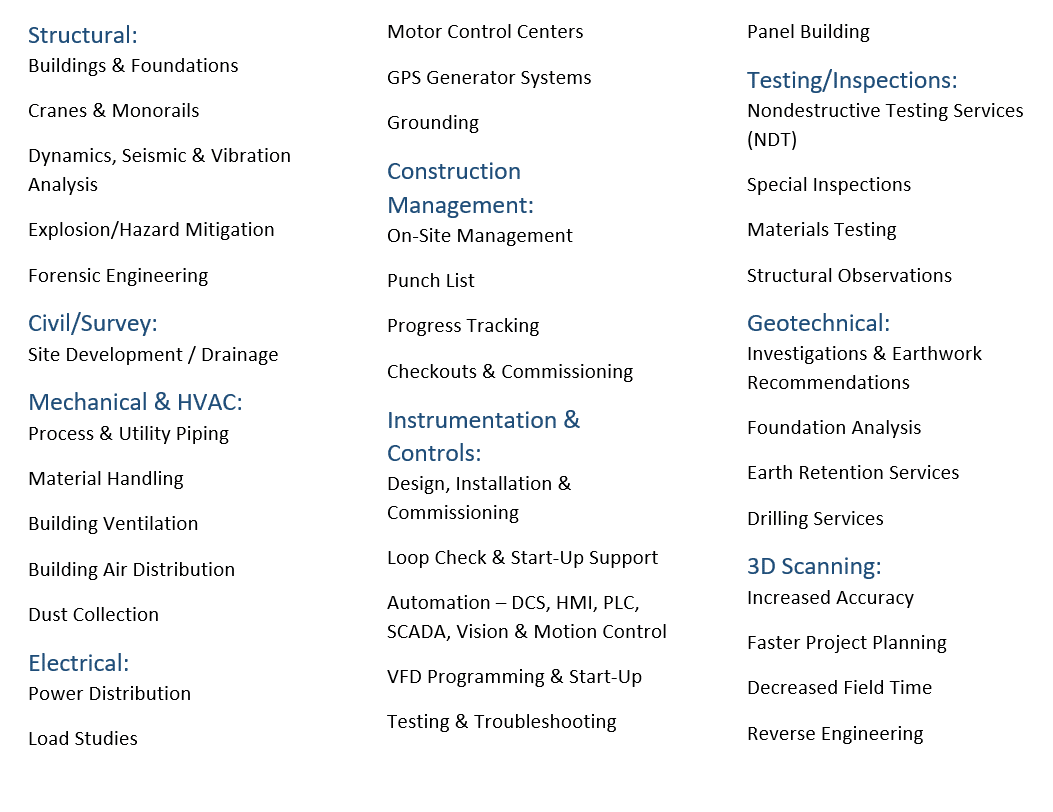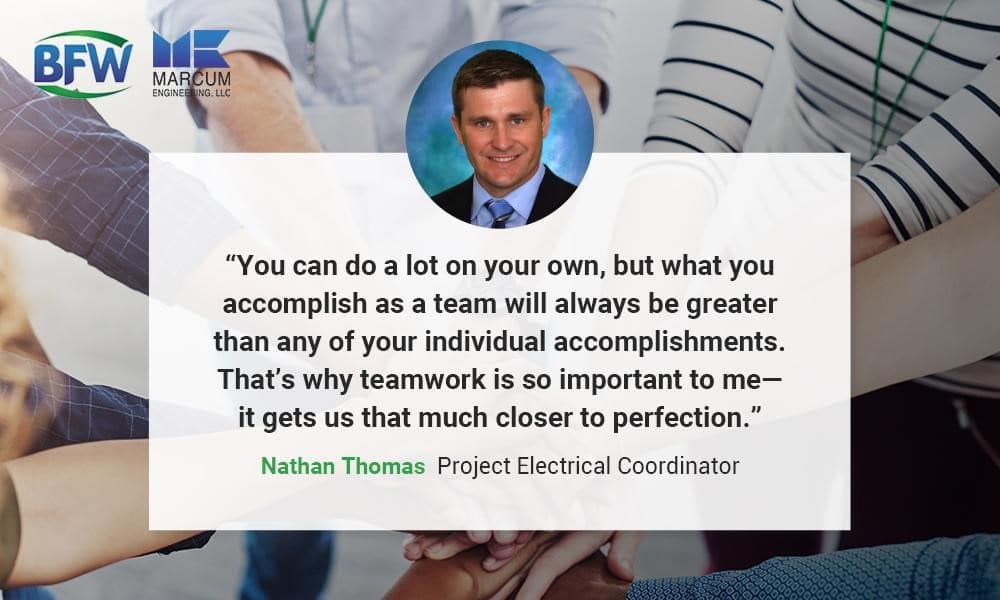Industrial engineering is responsible for so much of what we take for granted within the modern American landscape. Not only did it provide the convenience and industry that powered and nourished Americans during the industrial age, but it has also been responsible for much of what we still take advantage of every single day.
Chemical processing gives us fuel, food, cleans our water, and even powers our homes. Manufacturing plants build the cars we drive and the parts to repair them. More than likely, even the candles you blow out on your birthday are manufactured in an industrial factory. At BFW/Marcum, we aim to nurture an efficient and sustainable method for supporting and expanding the old fashioned American industry. However, building large-scale structures commonly found in industrial engineering is no easy task.
“Good” is Easy; It Takes a Multi-Faceted Approach to be Great
We’ve long discarded the standard of “good” at our firm. It’s too easy to simply finish something and move onto the next big thing. Today, we’re primarily interested in what makes greatness. The complicated nature of engineering an industrial project can make good awfully enticing. However, we’ve found that a multi-faceted approach that converges multiple disciplines and perspectives is the way to greatness.
While it may seem counterintuitive, we’re not afraid of a healthy, constructive debate between engineers about large-scale projects. We’re not willing to compromise quality, and reaching the level we’re interested in requires diverse perspectives.
Chris Whiting, our Professional Structural Engineer, understands the importance of divergent perspectives when it comes to industrial engineering:

“The most effective part of BFW/Marcum’s Industrial Department is that it’s well-rounded and full of individuals who all have their own diverse backgrounds both in their education and their respective experience. Our multi-disciplined team communicates well and holds each other to an incredibly high standard.”
Nathan Thomas, our Project Electrical Coordinator, agrees:
“The Industrial Department at BFW/Marcum was founded on the idea that great working relationships are a product of quality, loyalty, and communication. We all bring with us a broad range of skills, which makes our team perfectly adaptable to our clients’ needs. Most importantly, the industrial field is a reactive industry that requires quick thinking and exceptional listening and communication.”
“We keep each other in check. It makes things that much easier knowing we all come from different engineering backgrounds. We have our individual wheelhouses and we defend that expertise, but having a critical eye from our fellow teammates frees us from making assumptions due to our biased experience.”
What We Do for Our Clients
We’re always expanding our expertise, especially in our Industrial Department. Currently, we offer our clients a multitude of competitive capabilities:

How Our Industrial Engineering Division Shines
Simply put, our team works well together. They understand the nuance between giving critical input and being argumentative. A great, multi-disciplined team works similarly to a jigsaw puzzle—each piece has its place, and collectively makes a beautiful final design. Because our team works well together, we pride ourselves on our efficiency. With great efficiency comes significant savings to our clients.
Nathan expands on the prowess of his team:
“Our diverse perspectives allow us to take on new challenges while still maintaining excellent project efficiency. Honestly, we work so well together and we’re always eager to challenge each other.”
He brings an incredible understanding of power system studies and design, protection coordination, arc flash studies, and medium and low voltage system design to the team.
On the other hand, Chris’s focus is on structural analysis for extreme loading conditions. To put it in simple terms, he designs industrial buildings to withstand things like blast loads (accidental explosions) as well as wind damage from severe weather. With Chris’s input, a tornado has no hope against your local power plant. Thanks to Nathan, the plant will stay powered the entire time, as well.
Baccus Oliver, Principal of Marcum Engineering, is another key asset to our industrial division. He’s almost done it all in his twenty-nine years of engineering experience. Principally, he focuses on the front end of the project where he helps get the ball rolling and ensures it stays on the right path.
“I have over nine years of industrial design experience where I focused on project management. I’ve brought this expertise to Marcum, where I help conceptualize our industrial projects and assist with driving ideas through to our design team. I’m an advocate for good ideas and I enjoy developing them with my team and watching our ideas evolve and get better as they progress through our different departments.”
Investment in Our Industrial Division Is an Exciting Prospect
Investment doesn’t just mean fancy tools and software, although we love that stuff, too. Instead, we take a diversified stance toward investing in our industrial division. We want to invest in all facets to give every level of our service the ability to become better and better as we continue to grow.
We are always hiring qualified people even if we don’t yet have a clear spot for them. We want to have the best engineers on board, and we’re always thinking larger and larger scale, which takes qualified people, so the more, the merrier. Also, BFW/Marcum provides continuing education to ensure our people have a firm grasp on all of the cutting edge concepts before they’re prolific within the industry. We want to be first on board—we’re leaders, not followers.
“Personally, BFW/Marcum has encouraged me to serve on the committee for the American Society of Civil Engineers (ASCE), which is in the process of rewriting and publishing an updated version of the ASCE Standard for Blast Protection of Buildings (ASCE/SEI 59).”
Nathan has made great strides as well, and finds bringing his continually expanding expertise to the department to be rewarding:
“I’m on my way to earning my PE license by the end of this year. We’ve also made great strides in our capabilities within the department. It’s easier if I just list them!”
- We’ve added electrical coordination and flash studies to our competencies.
- Our mechanical group has increased its scope to include team systems evaluation and design.
- As of this year, we do relief valve scenario analysis and sizing.
- We will shortly add solids handling analysis and design.
- Our department can now estimate process emissions for air permitting.
“We’re always looking to do better and to increase our scope. This year was a big one, to say the least.”
Every Industry, Every Discipline, and Every Business Needs Teamwork
Because we’re so proud of how well our Industrial Department works together, we asked Nathan and Chris what teamwork meant to them.
Nathan emphasized the need for commonality:

“To me, great teamwork happens when everyone shows up to work with a common goal and a common purpose. Teamwork is the product of having a deep understanding of each other’s purpose with regards to the project. Having such an understanding means you can anticipate each other’s moves.”
Chris has his eye on the greater accomplishments that come from a well-seasoned and competent team:
“Great teamwork is the ability to work together in order to accomplish a goal greater than any individual could accomplish on their own.”

Recent Comments